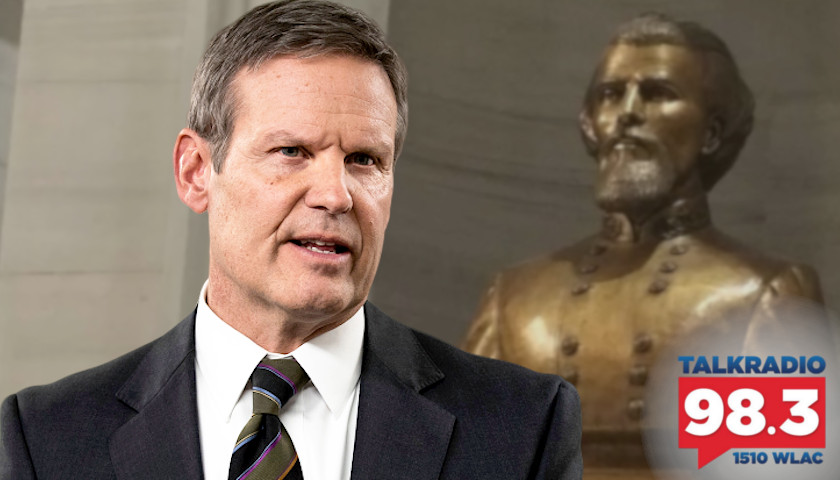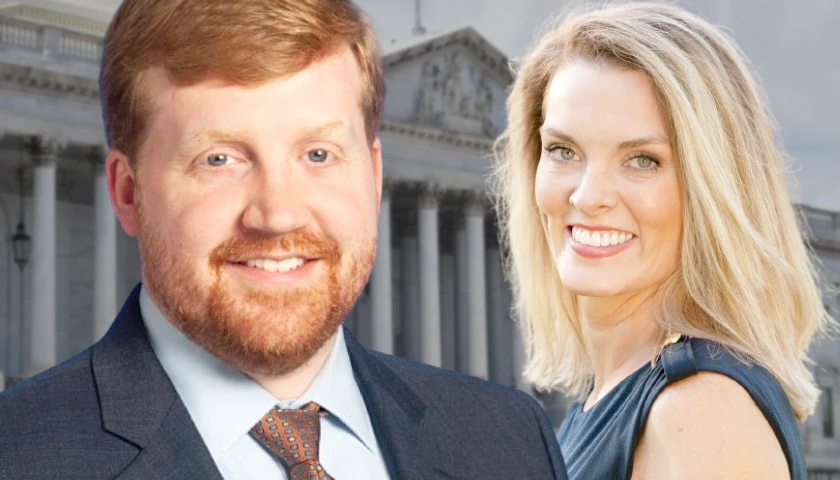Live from Music Row Friday morning on The Tennessee Star Report with Michael Patrick Leahy – broadcast on Nashville’s Talk Radio 98.3 and 1510 WLAC weekdays from 5:00 a.m. to 8:00 a.m. – host Leahy welcomed Tennessee Star Senior Reporter Laura Baigert to the newsmakers line.
During the second hour, Baigert weighed in on the recent meeting where Governor Lee decided to remove the bust of Nathan Bedford Forrest from the State Capitol. She found it particularly interesting that it was known and attended by protesters and other local media however seemed to forget notifying The Tennessee Star.
Leahy: We are joined now by our senior Capitol Hill correspondent. The intrepid Laura Baigert who by the way if a Pulitzer Prize was given out properly for conservatives she would be winning it for her fantastic reporting on Tennessee state political news.
Baigert: Well thank you, Michael. Good morning. How are you?
Leahy: Another very detailed story from you. Our lead story at The Tennessee Star. State Capitol Commission Votes to Remove Nathan Bedford Forrest Bust from Capitol After In-Person Request From Governor Lee. Tell us what happened yesterday.
Baigert: OK. It was quite unusual for a lot of reasons and largely because of how much the governor weighed in on it. This commission is set up with 12 members on it and three are ex-official members from Governor Lee’s cabinet. So that’s already been established from the General Assembly. And then the governor gets to pick three private citizens for that commission as well. Then there are two members of the legislature.
One from the Senate, one from the House, and then three constitutional officers who are appointed to those positions or elected to those positions by the General Assembly. But the day before the meeting the governor came out and made remarks that he wanted the bust moved and said that this process has been a year in the making in part because of putting the right people on the commission.
Leahy: That is people who would follow the governor’s line correct?
Baigert: Apparently. As you go through some of these steps in this it becomes more evident that that must have been what he meant because he made those remarks weighed heavily on what the commission should do. And three of these people where his direct reports that serve in his cabinet. If we think that doesn’t put some influence on those folks.
Leahy: Yes. They obviously have to toe the line of what the governor wants.
Baigert: Right.
Leahy: Now the history of this is that Nathan Bedford Forrest of course a Confederate general. Very controversial. Perhaps the greatest cavalry commander in American history and also a slave owner and slave trader.
After the war and the KKK was founded he was asked to be the president. When it became violent he disbanded it and then became very very interested in promoting reconciliation between Blacks and whites. He died in 1877. So a complex person and a complex story. In 1978 the state legislature unanimously voted to place a bust of him there to counterbalance admiral who was a union hero from Tennessee.
Baigert: Right. What can’t be missed in that unanimous vote is that this was a Democratic legislature at the time promoting the resolution to put the bust there. It was proposed by Democratic Senator Doug Henry. To just override what the legislature wants and that goes further in that the legislature had taken up this issue and spent hours in particularly the House.
Leahy: In this session?
Baigert: In this session and in particular, this year spent hours in a committee called the Naming Designating Private Acts Sub-Committee. Hours talking about Nathan Bedford Forrest. And these measures moved nowhere. But a measure that did move was passed by both the House and the Senate that two more citizen members appointed by the Speaker of the Senate and the Speaker of the House, one for each would be on this commission. And that bill was signed both leaders and is waiting for the governor’s signature.
Leahy: And he’s not signed that. Let me just come back to the legal authority by which the state capitol commission made this decision to move the controversial bust of Nathan Bedford Forrest which is one of the major objectives of the Black Lives Matter movement here in Nashville. So they have caved in essence.
The governor has caved to Black Lives Matter here on this and I think on several other things. The authority to place the bust there was a unanimous act of the state legislature. Is it the State Capitol Commission’s legal authority to move that bust? Or is it the state legislatures’ legal authority to do that?
Baigert: Well kind of not either believe it or not. The State Capitol Commission’s process is the has to go through the Tennessee Historical Commission. Nothing can be moved unless the body that controls the public property where a monument is located requests a waiver for a move. So it’s a very complex and long-winded process. So this is the first step where the State Capitol Commission had to petition for a waiver to move the bust.
Leahy: Did they petition the Tennessee Historical Commission for that waiver to move the bust?
Baigert: Not yet. They voted yesterday to prepare a petition.
Leahy: Oh.
Baigert: And so three years ago this was an issue because they wanted to have a sub-committee that was going to develop the petition in 2017 and that petition would never come back and it still isn’t going to come back for the commission to review and vote on the wording of it to make sure that their actions are carried out the way they want them carried out.
Leahy: So the next step in the process is that the waiver is sent to the Tennessee Historical Commission.
Baigert: Right.
Leahy: Who serves on the commission and when will they make that decision to accept that waiver?
Baigert: 29 serve on the commission. 24 of them are governor appointees and himself including ex-official members. So 24 appointees plus five ex-official members including the governor.
Leahy: So it seems like it’s already a done deal?
Baigert: It would seem. That meeting was a public meeting and it cannot be scheduled for less than 60 days. It has to be more than 60 days after the petition so the people have proper notice. That’s initial meeting and gather their data and then another 180 days they have to take action. It seems like this is a pretty long-winded process.
But when I was mentioning too about this meeting being scheduled the way that it was a couple of things. This bill is sitting out there waiting to be signed that would have given the General Assembly control over the meeting and perhaps tilt the makeup of the commission. We had Governor Lee weigh in the day before and actually prior to but not realizing that the meeting was scheduled the way it was. Then he came in and made opening remarks.
Leahy: Was this kind of a sneaky way to hold the meeting?
Baigert: Well and then you add to it the agenda for the meeting and the notice for the meeting on the commission’s website both say its a WebX meeting only. It never said it was an in-person meeting where the location was.
Leahy: So you didn’t know where it was. You are part of the press. And had you’d gotten that notice would have attended right?
Baigert: I would have attended in person. It wasn’t until I turned on the WebX meeting where I saw that there were members of the legislature in the meeting room and members of the media.
Leahy: Hold up. Other members of the media? How did they know to be there?
Baigert: That’s a good question.
Leahy: It just seems to me like Governor Lee was looking for a friendly audience to be able to virtue signal on this issue. That’s what it looks like to me.
Baigert: And the protesters knew because you could hear them outside the closed doors.
Leahy: Oh the protesters knew about it but The Tennessee Star was not informed about it?
Baigert: Right.
Leahy: Hmm.
Baigert: I got to believe this is going to be another situation where the governor and the legislature are going to get a little sideways with each other because this is another situation where it looks like what the legislature wants, they had a chance to weigh in with the State Capitol Commission to say please take up this issue and have a meeting on it.
And they wanted to change the makeup of the commission. They did not get the change that they wanted before this meeting was held and they chose not to take up any other action asking the state capitol commission to do something about it.
Leahy: Our readers on this story are generally not impressed with the governor’s high handed and sneaky way of virtue signaling on this. A lot of people are saying this is not going to help him when he considers re-election. Any reaction on your part?
Baigert: And you look at that on top of the refugee resettlement and these are not things that make our readers happy.
Listen to the full second hour here:
– – –
Tune in weekdays from 5:00 – 8:00 a.m. to the Tennessee Star Report with Michael Patrick Leahy on Talk Radio 98.3 FM WLAC 1510. Listen online at iHeart Radio.
Photo “Bill Lee” by Bill Lee.





